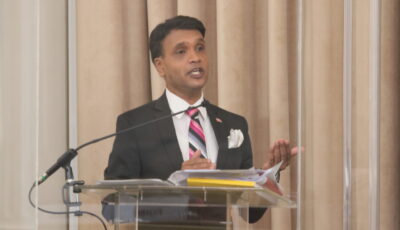HEADLINES
Commentary
Rowley strenuously objected to the construction of Penal-Debe UWI Campus
The media is reporting that the UWI Penal-Debe Campus, built during the People’s Partnership Administration continues to sit empty and has never
Posted On 30 Oct 2023
Blighted WGTL Project continues to haunt PNM
That World Gas-to-Liquids project is another of the many PNM scandals and failed projects which has cost taxpayers billions of dollars! And it is
Posted On 22 Jun 2023
Who financing Balisier House?
Ferdinand Ferreira, a founding member of the People’s National Movement (PNM), is quoted in the media as saying that the party has always
Posted On 03 Apr 2023
UNC SENATORS DEFENDED THE PARTY WELL TODAY
Today, the Opposition UNC Senators defended themselves and the Party well from the frivolous, anti-democratic motion by Senator Anthony Viera.
Posted On 22 Feb 2022
COVID WORKERS FIGHTING A WAR WITHOUT THEIR PROPER WEAPONS
We congratulate Kamla Persad-Bissessar on her success in forcing the Government to conduct an inquiry into the handling of covid. We take this
Posted On 20 Feb 2022
Letters
For fools rush in where angels fear to tread
The National Security Minister’s recent unrestrained language and conduct towards judges and unjustified criticisms of their judicial functions
Posted On 14 May 2023
Seek a fresh mandate
I recently read in one of the daily newspapers that Minister of National Security Fitzgerald Hinds said that 70% of society wants to see him
Posted On 27 Dec 2022
Don’t Blame God for Rowley’s Dotishness
Prime Minister Keith Rowley at the PNM convention on December 4, 2022, announces a National Day of Prayer. He said the country must come together
Posted On 16 Dec 2022
Keith Rowley has betrayed the sanctity of Parliament
Dear Editor, The revelation by the Commissioner of Police that the emails which Keith Rowley, then Opposition Leader read in our nations
Posted On 19 Jul 2019
T&T owes Kamla a debt of gratitude
Kamla Persad-Bissessar did what many were not expecting… she and her MPs voted unanimously with the Government to ensure passage of the Civil
Posted On 09 Apr 2019
Press Releases
Tancoo: Flooding imminent as Government fails to act
After a couple days of scattered “April showers” earlier this week, MP for Oropouche West, Dave Tancoo is again warning that severe flooding in
Posted On 06 Apr 2024
MP Khadijah Ameen wants justice for Kiss Driver’s death
Member of Parliament for St. Augustine, Ms. Khadijah Ameen is calling for justice for the death of Kiss delivery driver, Neil Ballai. Ballai was
Posted On 06 Apr 2024
UNC’s Persistent Pressure Forces Rowley Gov’t to Release 2024 EBC Report
On the heels of intense, consistent pressure from the UNC over their highly questionable refusal to lay the 2024 EBC Boundaries Report in
Posted On 06 Apr 2024
Moonilal: Hinds Fails Fire Service, Lives at Risk as Equipment Crumbles
The collapse of the Trinidad and Tobago Fire Services is another crushing indictment on the spectacularly failed Fitzgerald Hinds as Minister of
Posted On 05 Apr 2024
Padarath: Gov’t Electricity Rate Hike “Unbearable Burden”
Princes Town MP, Barry Padarath said that the contents of a report in yesterday’s Business Guardian headlined “RIC Recommends
Posted On 05 Apr 2024
Speeches
Tancoo: calls on Imbert to have a heart and indemnify the population
Today we come to you to shine some light on a very worrying development that has happened in the past few days. I am sure many of you saw or
Posted On 08 Sep 2021
Rowley’s Mad Power Grab in Tobago
My friends, we are seeing a government that is in freefall – in every single sector. Health, National Security, the business sector. And what
Posted On 16 Feb 2021
Presentation of UNC general election candidates 2020
T&T family! UNC family! It is my absolute pleasure to speak with you today, as we get ready for the sweeping victory that is to come on
Posted On 19 Jul 2020
Kamla: My vision is to build an intelligent nation
“ON THE BALLOT” UNC VIRTUAL MEETING (June 25, 2020) Introduction Good evening and thank you for joining us once again as we continue to set the
Posted On 26 Jun 2020
MNF – Kamla: There is hope
Introduction Good evening T&T! Good evening UNC family! It is good to be back! 2020 we are ready to rumble! Are you ready? Even though it’s
Posted On 11 Mar 2020
Copyright © - 2023 United National Congress







Slipping into the abyss
Kevin Ramnarine.
By Kevin Ramnarine
Last Sunday morning I asked the guy behind the counter at Richard’s Bake and Shark to borrow his newspapers. He said “sure, but it’s all bad news.” I gathered that what was in those newspapers affected him. He was not alone but was simply reflecting the broad national sentiment.
He may have been ruminating on the murder of 15-year-old Abiela Adams who was found with her throat slit. The sight of yet another young woman murdered is unbearable, unacceptable and untenable. Her grandmother called for the death penalty to be implemented.
Crime has the entire country on edge. Responsible parents (and there are many) now suffer from anxiety when they take their children to malls. You can’t take your eye off your children in the grocery. People have taken to Facebook to tell of encounters with suspicious individuals in public spaces. Every day on Whatsapp there are voice notes and videos circulating pertaining to criminal activity.
Where are we going as a country? Are we headed in the direction of Honduras (the most murderous nation on Earth)? In an attempt to do something, the Prime Minister had a national conversation. This backfired badly. His “Trumpian” remarks about him not being in women’s bedrooms incensed the women of T&T as never before and rightly so.
Where does the buck stop when it comes to crime? At the national conversation, the Attorney General managed to get an opportunity to update the country on efforts at implementing the death penalty. He lamented the under resourcing of the DPP’s office but assured it was being fixed.
The argument that we need to first catch people to implement the death penalty is misplaced. There are currently people on death row who have not yet made the five-year Pratt and Morgan limit.
If there is an effective management of the time lines related to appeals, some of those can be executed. It was done in 1999 and with the correct focus and resourcing it can happen again. To those that don’t like the death penalty-it’s the law.
The death penalty was last implemented 18 years ago (1999). In that year ten persons were hanged including the entire Dole Chadee gang.
That year we recorded 93 murders. Those of us who recall those days in mid-1999 will remember the eerie cloud of silence that descended over Port-of-Spain. In 1999, the State demonstrated that it was in control.
In 2017, the criminals are in control. Sadly, at the current rate of murder, we will probably surpass the 1999 figure sometime in March 2017.
It is noteworthy too, that while in 1999 we recorded 93 murders, by 2008 that figure leaped to 550 murders. What caused the almost six-fold increase in murders?
Any attempt in dealing with crime needs to answer that question. We need to get to the root of the problem. We have been treating the symptoms of a deeper malaise.
Crime is a product of an ecosystem. Twenty-one-year-old boys don’t wake up and suddenly become bandits.
They are the product of an ecosystem that has social, economic and political dimensions. Theories abound transnational narcotics trade, influx of guns, emergence of gangs, single-parent homes and failed education system etc. The list is long.
In an earlier column, I posited that it was interesting to note that in the same period we experienced the greatest economic expansion in our history (1999 to 2008), we also experienced an explosion in crime. There was in that period a quadrupling of GDP at current prices. So, in a nutshell, as we got richer, crime increased.
The sub-period 2002 to 2008 also saw a spate of kidnappings for ransom that traumatised the country and more so its businessmen. In many ways, the forces that shaped the six-fold increase in murders from 1999 to 2008 are still here.
What is the issue-is it a problem of resource deficit or resource allocation? Are we using technology as we should? Is it a lack of leadership? We don’t need any more laws. Laws are pieces of paper that have no effect unless they are enforced.
The Offences Against the Person Act says the penalty for murder is death. The law must be implemented. At the same time, hanging people should not be seen as a panacea for criminality.
The Police Service, the administration of justice and the prison system need to be fixed. I suspect the courts, the police and the prisons are operating with the same resource bases that they had in the year 2000. In the last 17 years their capacities would have therefore been overwhelmed.
The Government cannot abdicate its responsibility to provide a safe environment for the people of this country. It cannot stand helplessly by with a laundry list of excuses. We are failing our children and it starts in the homes and in the schools.
The Government must sit with the NGO community, especially those that operate in high risk areas, and empower them. Dealing with crime is the biggest challenge we face. We must draw a line in the sand and deal with it least the country slip into the abyss.
Kevin Ramnarine is a former Minister of Energy of Trinidad and Tobago
Guardian Feb 14 2017
Share this:
Like this:
Things Fall Apart
Imbert misleading the country on Petrotrin
Commentary
Rowley strenuously objected to the construction of Penal-Debe UWI Campus
Blighted WGTL Project continues to haunt PNM
Who financing Balisier House?
UNC SENATORS DEFENDED THE PARTY WELL TODAY
COVID WORKERS FIGHTING A WAR WITHOUT THEIR PROPER WEAPONS